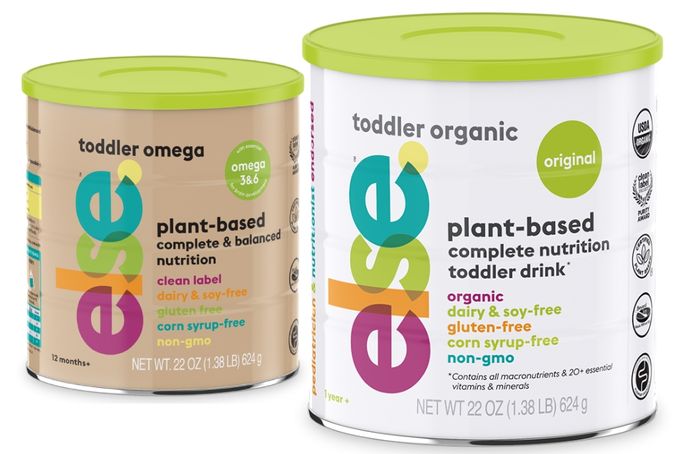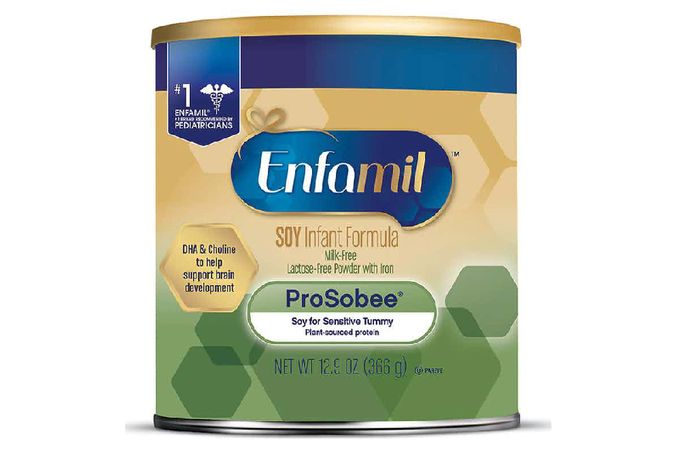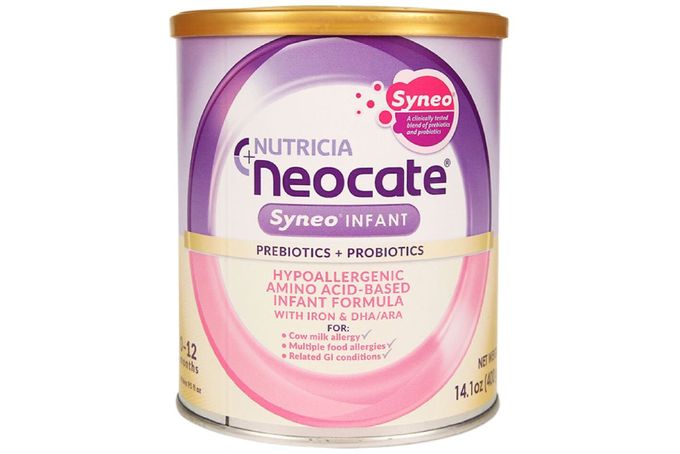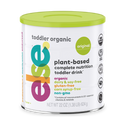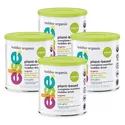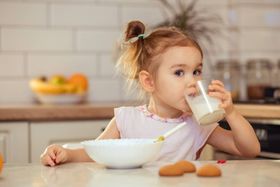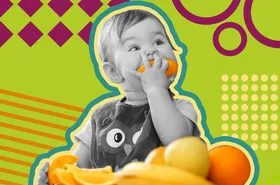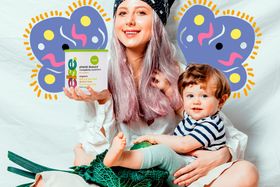3 Best Dairy-Free Formula Picks: Nourish Without Compromise
Looking for a a gentle, effective dairy-free formula for your kid? Explore our top picks that nourish your child without sacrificing nutrition.
Updated June 18, 2024

With a growing number of children showing sensitivities to cow's milk, many parents are desperately seeking alternatives to traditional formulas. If you're one of them, you might be overwhelmed by the sheer number of choices on the market, each claiming to be the best solution.
We're here to help! Below, we'll explore the top options available today, breaking down their ingredients, benefits, and potential drawbacks. Whether you're dealing with allergies or simply looking for alternatives, we'll help you find the best dairy-free formula to nourish your little one.
» Nourish your child without compromise with soy- and dairy-free toddler formulas
1. Else Plant-Based Complete Toddler Nutrition
Best Plant-Based Dairy-Free Formula
For toddlers—babies older than 12 months—the Else Plant-Based Complete Nutrition for Toddlers is an excellent dairy-free, plant-powered alternative. It’s made with over 80% natural whole-plant ingredients, including almonds, buckwheat, and tapioca.
» Discover how plant-based milks compare to toddler formula
It's suitable for babies with dietary restrictions like lactose intolerance, FPIES, or even dairy allergies. Our team designed it with your baby's development in mind, combining plant proteins, unsaturated fats, carbohydrates, vitamins, and minerals.
Our dairy-free formula is also eco-friendly and leaves a lower carbon footprint than traditional farming methods. By choosing it, you're endorsing ethical and sustainable food production practices that are lowering the food industry's environmental impact.
2. Enfamil ProSobee Soy Infant Formula
Best Soy-Based Dairy-Free Formula
Enfamil ProSobee Soy Sensitive formula is designed to help ease fussiness and gas caused by milk-based formulas. Soy-based formulas are a good choice for babies with galactosemia or families that are on a vegan diet. They extract the pure isolate from the plant for protein and use corn maltodextrin for carbohydrates.
You should be careful! Soy-based formulas can have a certain level of isoflavones—which are similar to estrogen—that can affect your little one's hormonal activity. Consult a pediatrician before giving your baby a non-dairy baby formula that's soy-based.
» Recognize the signs of soy intolerance in kids
Other non-dairy, soy-based formulas worth mentioning are:
- Earth’s Best Organic: non-GMO, lactose-free, and kosher-certified alternative
- Similac Soy Isomil: Includes DHA, lutein, and vitamin E to support vision and brain development.
- Mama Bear Soy-Based Powder Infant Formula: Designed for babies up to 12 months and includes over 25 vitamins and minerals
3. Neocate Syneo Infant
Best Hypoallergenic Dairy-Free Formula
Neocate Syneo Infant Hypoallergenic Formula formula contains DHA and ARA, fatty acids commonly found in breast milk. It's suitable for babies with dairy protein allergies.
Hypoallergenic formulas are essential for infants with CMPA because the manufacturers break down their allergy-causing proteins. Extensively hydrolyzed ones, which dissolve casein or whey into smaller peptides, are the recommended first-line treatment for CMPA. They provide relief for over 90% of affected infants.
» Explore a safe, plant-based alternative to cow's milk for complete infant nutrition
Babies with CMPA should avoid alternative mammalian milk and soy due to high cross-reactivity with cow's milk proteins, and Else's Formula for Toddlers is free from both. It's also packed with essential nutrients and is USDA Organic certified.
Other non-dairy, soy-based formulas worth mentioning are:
- Bebe M: Excludes dairy and soy allergens to accommodate the dietary needs of infants with cow milk protein allergy (CMPA) or lactose intolerance.
- PurAminoBaby’s Only Organic: Offers a non-dairy alternative using organic pea protein for children with allergies to dairy and soy
- Gerber Good Start: Friendly for babies with all allergies except soy and is also more budget-friendly. It's non-GMO, free from lactose, and kosher-certified, albeit some ingredients may not be suitable if you're looking for vegan options.
» Uncover if a plant-based formula is healthy for your baby
How to Transition to a Dairy-Free Formula
1. Do It Gradually
You should gradually shift to the non-dairy formula by blending the new brand with the old one and progressively reducing the quantity of the original. You should also consistently feed it to the baby at least three times a week to help them get used to it. This helps the baby gradually adjust to the new taste and texture. If you're replacing standard options with hydrolyzed options, you won't have to do it slowly.
» Here's how to transition your baby from breast milk to formula
2. Monitor for Progress
Monitor the baby’s bowel movements and look for signs of formula tolerance. To reduce the likelihood of discomfort, such as reflux, feed the baby in a relaxed setting, choose the right nipple for the bottle, and keep the baby upright after feeding.
» Find out what to do when your baby is refusing the bottle
If you see signs of colic in your little one, hold them in a sling, rock them gently, play soothing sounds, or massage them. If the problems persist or if you see signs of rectal bleeding or allergic reactions, consult a pediatrician.
3. Consult a Pediatrician
A pediatrician can help you before making the switch by doing the following:
- A thorough assessment of the baby’s health
- Consideration of any potential allergies
- Recommendations based on the baby’s specific needs
- Monitoring of the baby’s response to the new formula
- Adjustment of the dietary plan as necessary
» Try delicious, plant-based nutritional formulas your little ones will love
Nourishing Your Kid With a Lactose-Free Formula
Dairy-free formulas offer a safe and effective alternative for infants with allergies or who can't tolerate milk. The options we've discussed above can help your kid's specific dietary needs and preferences while providing a balanced mix of nutrients.
» Understand lactose intolerance vs. milk allergy in babies, toddlers, and children
If you're still deciding which one to pick, why not try Else Nutrition's Plant-Based Toddler Formula Collection? It's made with over 80% natural whole-food ingredients—free of gluten, soy, corn syrup, and GMOs. It's also certified by USDA Organic and Clean Label Project Purity.
FAQs
What are dairy-free formulas?
They're alternatives to traditional cow's milk-based formulas that cater to different dietary requirements and infant feeding preferences. They include soy-based, hypoallergenic, and plant-based formulas.
How do I know if my baby needs a dairy-free formula?
They may need it if they show symptoms such as liquid or frothy stools, irritability, stomach aches, bloating, gas, slow weight gain, or nappy rash when having dairy. Consult with a healthcare professional for a proper diagnosis and advice.
What formula is best for a baby with a dairy alergy?
The best formula for a baby with a dairy allergy is one that's extensively hydrolyzed, such as Enfamil Nutramigen, Similac Alimentum, and Bebe M's soy.
Even though they're dairy-free, they have the same essential nutrients found in conventional cow’s milk based formulas, guaranteeing proper growth and development for your little one.
Bebe M’s soy and dairy-free formula stands out for its content of Omega-3 and Omega-6 fatty acids, including DHA, ALA, and LA, crucial for a growing kid.
Disclaimer: The content and advice provided in this article is for informational purposes only and is not a substitute for medical diagnosis, treatment, or advice for specific medical conditions. Always consult a pediatrician to determine your child's needs.




